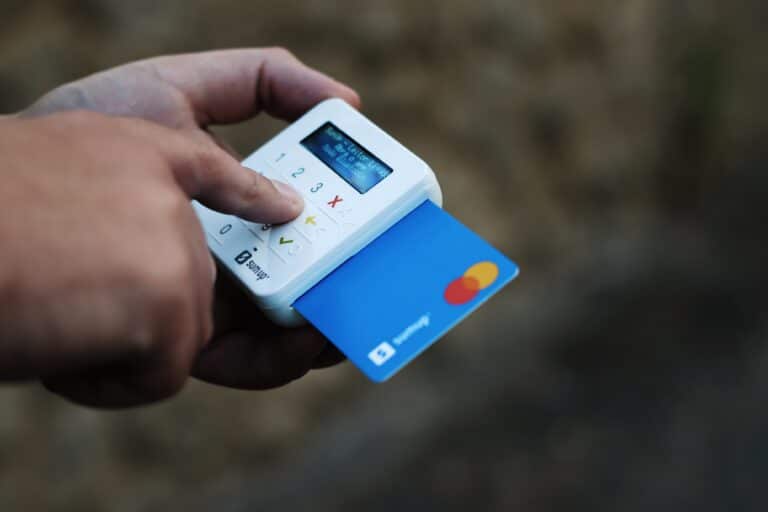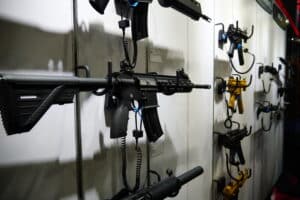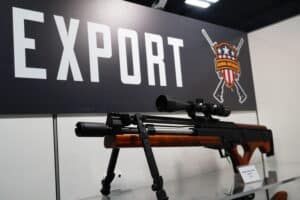The group that oversees credit card merchant codes agreed to create one for gun stores on Friday.
As first reported by Reuters, the International Organization for Standardization (ISO) created a specific code for gun stores. As is the case for most specialty stores, purchases made at gun stores will now be categorized in bank records. Visa, Master Card, and American Express announced they would start using the new code on Saturday, according to the Associate Press.
That doesn’t sound so controversial on the surface. After all, almost every industry has a merchant code. And it may end up not being very controversial if things don’t progress past this first step.
However, this is just the first step for the people behind this change. And it’s one that gun-control advocates have been pursuing for years. It’s part of a broader–if half-baked–attempt to surveil and scrutinize gun sales.
Amalgamated Bank, an activist financial institution deeply connected to liberal interest groups, including the top gun-control groups, has been pushing the ISO to adopt a specific gun merchant code for a long time. The move had been rebuffed by opposition from other financial institutions, including the major credit card companies. But they received additional support from Democratic politicians during its most recent successful push.
The goal of the move is to create a kind of private surveillance system for gun-related commerce in the United States. The general hope is that banks will use the new code to watch for “suspicious” buying patterns and then report their own customers to authorities for further investigation. The idea was inspired by a 2018 New York Times report on how mass shooters have used credit cards to buy their guns.
“We all have to do our part to stop gun violence,” Priscilla Sims Brown, president of Amalgamated, told The Times on Friday. “The new code will allow us to fully comply with our duty to report suspicious activity and illegal gun sales to authorities without blocking or impeding legal gun sales.”
There are several issues with this approach, though. The first, as exemplified in Ms. Brown’s quote, is the code will not help banks determine if a sale at a gun store is illegal. That’s why we have FBI background checks on all sales made by those gun dealers.
In fact, it won’t even track actual gun sales. It will track all sales made at the stores designated under the new code, which probably won’t be all stores that sell guns. Many, possibly most, gun sales in America are made, like most things, through big box retailers.
It’s unclear whether ISO will reclassify retailers like Cabelas, Dick’s Sporting Goods, or Sportsman’s Warehouse.
Even if they are, the merchant code itself provides no insight into what a credit card customer is actually buying at a store. The code doesn’t give granular information on what the customer purchased. $5,000 spent at Cabelas could be on one high-end rifle, a dozen cheaper guns, an expensive BBQ grill, or a couple of kayaks. Similarly, the same amount spent at a gun shop could be on a large safe, a collector-level gun, or any number of other products.
It’s difficult to imagine a pattern that could be identified through the use of merchant codes that catches potentially dangerous people (who are either passing background checks to lawfully buy guns or, perhaps, not buying any guns at all in this scenario) without also entangling a vast number of innocent people. This is especially true when IDing potential mass shooters (who remain statistically rare) through their credit card usage, as suggested by The Times.
Their reporting indicates that one of the shooters, whose name I will not repeat here, bought three guns over the course of two months. They spent $11,000 across several different cards and retailers on things that included slings and paper targets. A different shooter bought two guns, some magazines, and a few thousand rounds of ammo in a week.
In a country where over a hundred million people own more than 400 million firearms and Americans hold a total of $841 billion in credit card debt, it simply isn’t that unusual for people to finance thousands of dollars worth of gun-related purchases over the course of a few weeks or months. It may not be a financially sound idea to finance gun purchases, but it isn’t remotely evidence of any wrongdoing.
The whole scheme strikes me as similar to noticing that mass shooters often use cars to drive to where they carry out their attacks and then trying to get the auto industry to screen all buyers for whether they own a gun and then have them report all those gun-owning car buyers to the police on the off chance they might turn out to be a mass shooter. It doesn’t make much sense, and all you’ll end up accomplishing is overloading the police with useless leads.
And reporting tens or hundreds of thousands of customers per year to the police on the extremely dubious thought that spending some randomly-determined amount of money at a gun store (on things that might not even be guns) doesn’t strike me as a particularly good business practice. Its unlikely customers will appreciate being reported to the police on such thin evidence. Visa’s early comments on the change indicate they aren’t planning to do that. At least, not voluntarily.
“Following ISO’s decision to establish a new merchant category code, Visa will proceed with next steps, while ensuring we protect all legal commerce on the Visa network in accordance with our long-standing rules,” the payment processor told The Associated Press.
But this is just the first step in what gun-control advocates ultimately want to see. As The Times lays out in its 2018 piece, trying to track some kind of predictive gun buying pattern for mass shooters would require much more invasive tracking of all gun-related sales by the financial industry. The bank would need to know not just that you were buying something from a gun store but what exactly you were buying. And it would need to cross-check those purchases with all the other gun-related purchases you made with your credit and debit cards from other banks.
Plus, the process would likely require government guidance, as has been the case with fraud reporting or terror finance tracking. The bigger vision seems to be creating a public-private surveillance system that tracks the gun buying habits of every credit and debit card customer in the country.
Failing that, the merchant code also makes it easier to pressure banks into cutting off the use of their financial products to buy from gun stores. Private and public actors have been trying to get banks to cut off financing to gun makers and dealers for decades, with varying degrees of success. This move makes it simpler to push for cutting off financing to gun buyers as well, even though that may prove to be a much steeper ask of banks given how vital lending to consumers is for their core businesses.
The adoption of a merchant code for gun stores is unlikely to amount to very much on its own. But if those other steps fall into place, the most likely outcome will be new suspicion cast on a huge number of gun buyers with little real impact on preventing gun crime or mass shootings. It may also result in further limits on the ability of Americans to gain access to firearms through the same financial institutions they use for the vast majority of their other purchases.







6 Responses
Perhaps other financial companies will see this as an opportunity to gain gun-related customers. I worry more about small business financing such as ammunition sales, small manufacturers, etc. If they start interfering with businesses, that can have a much more detrimental effect.
Indeed.
How is this not protected information? Who is authorized to access this information or does they have to have a subpoena?
My guess is those protections don’t extend to reporting the information to the police. But I will have to do more research on that topic.
Maybe the goal is less mass shooters and more those who evade state gun laws. Someplace like NY with a mag ban might be interested if a resident hits 2-3 gun stores in PA spending 2-300$ a pop. They could be buying excessive amounts of ammo or 15rnd mags.
Heck CA could attempt to use the data to see who “avoids” the ammo background check.
Yes, I would expect blue states to pass laws that require reporting transactions over a certain amount at the gun store MCC to be reported to local police. That’s what I would look out for as the realistic next step in this.